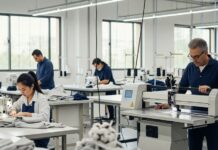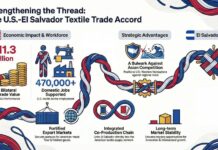The document titled “Vietnam Country Report: Macroeconomic, Socioeconomic, and Industry Analysis” offers a comprehensive examination of Vietnam’s economic and industrial environment, emphasizing the theme of sustainable growth in Vietnam.
This report is the inaugural installment of a series that incorporates insights from Cascale’s sustainability assessment tool, the Higg Facility Environment Module (FEM), exclusively showcased on Worldly.
An analysis of more than 1,200 validated Higg FEM submissions from 2023 indicates a notable carbon footprint linked to coal utilization, with 12% of facilities using coal directly and 94% relying on Vietnam’s coal-intensive electricity grid. Despite this, renewable energy constitutes less than 2% of energy consumption in this sector, highlighting a considerable opportunity for a shift towards more sustainable practices as outlined in the Industry Decarbonization Roadmap (IDR) developed by Cascale and Aii.
According to the report, Vietnam’s economic outlook projects an impressive growth rate of 6.5% by 2025, outpacing its regional peers. This growth is essential for achieving sustainable growth in Vietnam.
The manufacturing sector continues to be a fundamental element of this growth, contributing nearly 23.88% to GDP in 2023. Foreign Direct Investment (FDI) also underscores robust investor confidence, with $31.4 billion noted in the first 11 months of 2024.
The apparel and footwear sector supports three million jobs and is projected to generate $71 billion in export revenues for Vietnam in 2024. However, this industry is also facing significant sustainability challenges, including excessive energy consumption and carbon emissions.
Vietnam has committed to increasing its renewable energy share to 65-70% by 2045, aiming to reduce greenhouse gas emissions by approximately 70-80%, illustrating its dedication to decarbonizing the supply chain in accordance with the IDR. This commitment is vital for promoting sustainable growth in Vietnam.
The IDR ensures efficient allocation of resources, facilitating the achievement of low-carbon sourcing and additional benefits. This approach focuses on the critical 10% of sites within the textile and apparel supply chain, some of which are located in Vietnam, as these sites are responsible for over 80% of global manufacturing emissions.
The report suggests prioritizing the adoption of renewable energy and the integration of circular economy practices. It encourages brands to foster lasting partnerships with their supply chain partners, which will promote equity and stimulate transformative business practices. There is a strong emphasis on investing in the development of employee skills, particularly in sustainability and green technologies.
Additionally, the report advocates for staying updated on changes within Vietnam’s regulatory landscape to ensure compliance and seize emerging market opportunities.
Cascale CEO Colin Browne stated: “This isn’t merely about compliance—it’s about long-term competitiveness. Brands increasingly prefer suppliers who meet robust sustainability standards. Manufacturers investing in sustainability today will secure long-term brand partnerships tomorrow.” This reinforces the importance of sustainable growth in Vietnam for future business success.

































